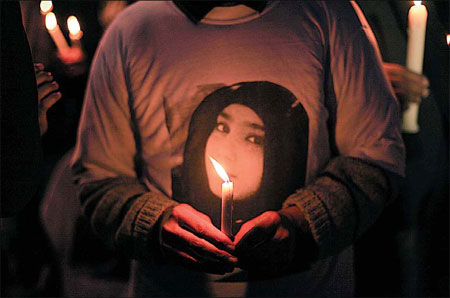Terrorism continues in Pakistan despite talks
Government pressures Taliban to identify those responsible for attacks
There has been no letup in terrorist attacks in Pakistan despite the unilateral declaration of a cease-fire by the Pakistani Taliban on March 1.
Recent terrorist attacks have raised renewed apprehension over the future of the peace dialogue between the Taliban and the government of Prime Minister Nawaz Sharif.
Just two days after the cease-fire was announced, militants attacked judges and lawyers in a heavily guarded court premises in the Pakistani capital, Islamabad. The attack killed 11 people, including a judge and five lawyers.
The bloodshed continued on Friday when two bomb attacks on security forces near the border with Afghanistan killed nearly 20 people and injured over 60.
One explosion took place in the southwestern city of Quetta and the other near the Peshawar in the northwest. Most of those killed were civilians.
A little-known group called Ahrar-ul-Hind claimed responsibility for the two attacks. The same group had taken responsibility for the Islamabad court attack.
However, some analysts doubted whether the group was really responsible for Friday's attacks, saying instead that the Taliban were responsible.
Although the Taliban have denied any involvement in the recent attacks, the style of the March 3 attack was similar to those previously carried out by the Taliban.
The Taliban are now under mounting pressure to publicly condemn the recent attacks and cooperate with the government to identify elements that are sabotaging the dialogue.
But Shahidullah Shahid, the Taliban spokesman, has rejected calls for help to determine who could be behind the terror attacks. He said it is not the responsibility of the Taliban to conduct an investigation.
Last month, the Ahrar-ul-Hind group sent e-mails to media outlets and journalists who routinely receive statements from Taliban sources.
When the sender of the e-mails refused to respond to queries on the group's make-up and leadership, journalists largely decided to ignore the group.
In its first e-mail to the media on Feb 14, the group said it opposed the peace talks and vowed to continue its terrorist attacks. The e-mail carried the photograph of the former Taliban chief, Hakimullah Mehsud, who was killed in a US drone strike in November.
The group received widespread media coverage when a man calling himself Asad Mansoor and claiming to be Ahrar-ul-Hind's spokesman called journalists in Pakistan to claim responsibility for the Islamabad court attack.
Another little-known group - Ansar-ul-Mujahideen - has also claimed responsibility for some attacks since the Taliban cease-fire, including the killing this week of two police officers who were escorting a polio vaccination team in Dera Ismail Khan district.
Ansar-ul-Mujahideen is thought to be a Taliban splinter group formed by hard-liners in North Waziristan tribal region. Correspondents in the region say that most of the group's members were originally from the Taliban faction led by Hafiz Gul Bahadar, who made a peace deal with the Pakistani army.
The new group has carried out several attacks in North Waziristan, including several last month, prompting the government to conduct massive airstrikes in the area.
The group has not disclosed the name of its leader but only its spokesman, Abu Baseer, who routinely claimed responsibility for attacks on security forces in North Waziristan and other northern areas.
The mushrooming of new militant groups in Pakistan in recent months has raised concerns for the stability of the country.
In particular, the ongoing attacks threaten to undermine the process of dialogue between the government and the Taliban, which will enter a decisive phase in the coming days.
Tehrik-e-Taliban Pakistan, the main Taliban group, is under continuing pressure to identify who is behind the ongoing campaign of terror, bringing any wayward Taliban elements under control if necessary.
Prime Minister Sharif and his key security advisers have made it clear that the current dialogue process is the last chance for the Taliban and the government to make peace.
|
A mourner wears a T-shirt with the picture of slain lawyer Fizza Malik during a memorial vigil on March 7 for the victims of an attack in Islamabad. Gunmen burst into a shopping area on March 3, killing at least 11 people in a suicide-bomb and gun attack likely to shatter any prospect of meaningful peace talks with Taliban insurgents. Mian Khursheed / Reuters |



















